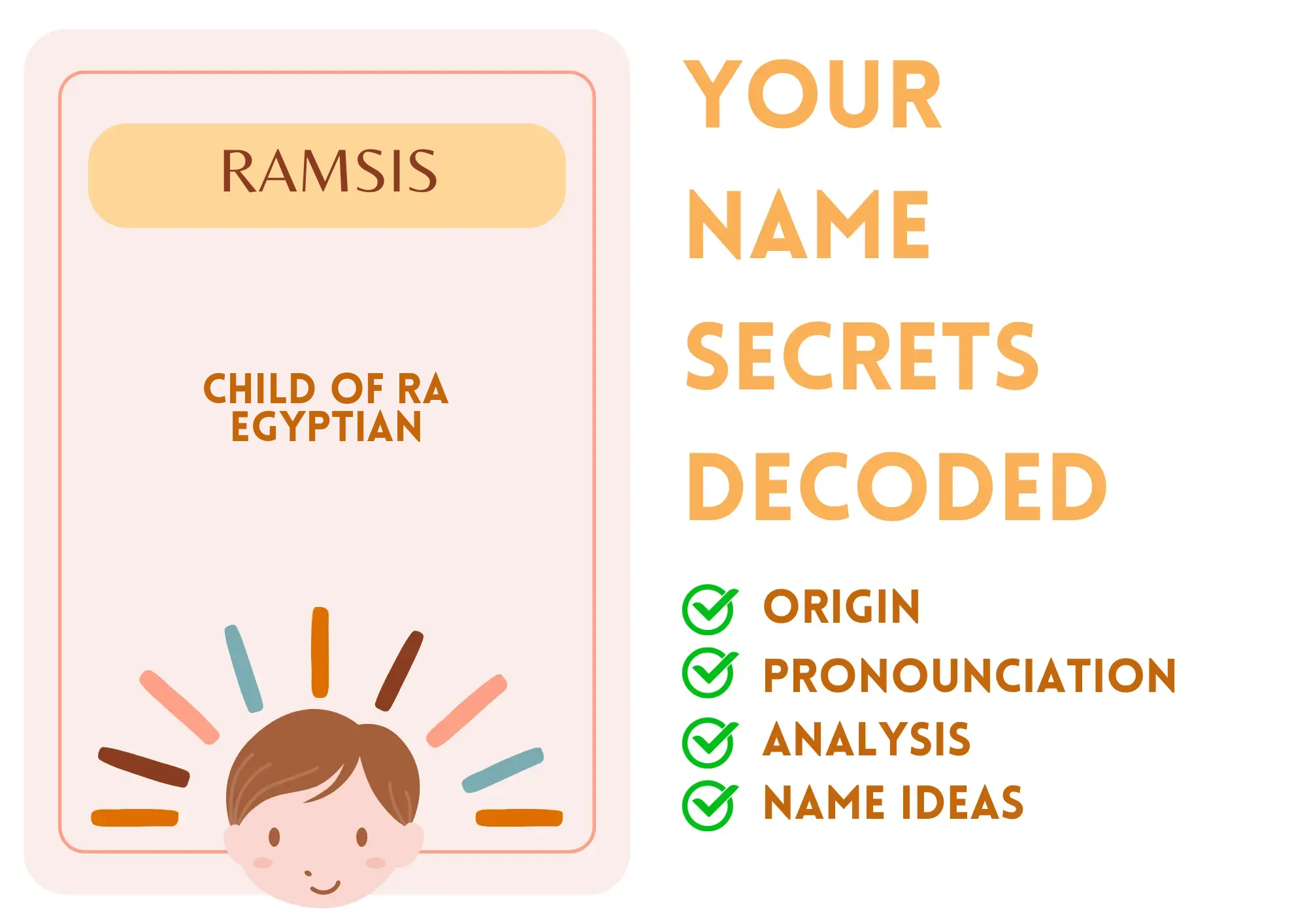
Ramsis
Ramsis is a name of significant historical and cultural importance, primarily derived from Egyptian origins, meaning 'child of Ra' (Ra being the ancient Egyptian sun god). The name is predominantly male and holds strong ties to Egyptian mythology and history.
In ancient Egypt, Ramsis (or Ramses) was a revered name, associated with several pharaohs, notably Ramses II, also known as Ramses the Great, who is considered among the most powerful and celebrated rulers of ancient Egypt. The name evokes notions of leadership, divinity, and strength.
People generally view the name Ramsis positively; it conveys a sense of heritage, power, and connection to ancient civilization. It is relatively easy to write and pronounce, offering a strong yet unique option for a baby name. Common nicknames include Ram and Sisi.
The name has its roots in ancient texts and continues to be recognized in modern popular culture, appearing in literature and discussions about ancient Egypt. It is an impressive choice for those looking for a name rich in history and meaning.
Basic Information
Gender: Boy
Sounds Like: RAM-sis
Pronunciation Explanation: The first syllable 'RAM' is pronounced with a short 'a' sound, while the second syllable 'sis' is pronounced as it is heard.
Summary and Meaning
Meaning: child of Ra (Egyptian)
Origin: Ramsis has roots in ancient Egyptian culture and language, particularly associated with rulers and divine significance.
Usage: Ramsis is traditionally a masculine name, associated with strength and leadership.
Name Number (Chaldean)
Name Number (Pythagorean)
Popularity (Global Rank)
Overall: 73690
Boys: 72681
Most Popular in
Religious and Cultural Significance
Religion: Ancient Egyptian
Background: Ramsis is linked to ancient Egyptian beliefs, particularly surrounding the sun god Ra and the pantheon of deities worshipped by the ancient Egyptians.
Cultural Significance: The name Ramsis is culturally significant due to its association with kingship and divine favor in ancient Egypt. It symbolizes a deep connection to the nation's rich historical legacies.
Historical Significance: Historically, Ramsis is associated with notable pharaohs, such as Ramses II, and places like the city of Memphis, representing power and political might in ancient Egyptian history.
Popular Culture
Literature and Mythology: Ramsis appears in various historical accounts and mythological discussions, often as a representation of kingship and divine authority.
Movies and Television: The name is referenced in documentaries and films about ancient Egypt, highlighting its historical context and significance.
Feelings and Perceptions
Perception: Ramsis is perceived positively, associated with strength, leadership, and a rich cultural heritage. It often elicits respect due to its historical significance.
Positive Feelings: Strong, regal, historical, unique, powerful.
Negative Feelings: Some may find it less familiar or harder to connect with contemporary naming trends.
Practical Considerations
Ease of Writing and Calling: Ramsis is relatively easy to write and pronounce. The name consists of six letters and two syllables, making it memorable and straightforward.
Common Typos and Misspellings: Ramzis,Ramses,Ramsiss
Common Nicknames: Ram,Sisi
Ramsis Popularity
Ramsis Usage and Popularity By Country
| Country | Rank (Overall) |
|---|---|
| Gambia | 1166 |
| Egypt | 2107 |
| Tunisia | 4053 |
| Syria | 5814 |
| Zambia | 6502 |
| Morocco | 6984 |
| Ethiopia | 7843 |
| Panama | 10180 |
| Israel | 12218 |
| Ghana | 12389 |
Ramsis Usage and Popularity By City
| City | Rank (Overall) |
|---|---|
| San Francisco | 15585 |
| Los Angeles | 24616 |
| Sydney | 24786 |
| Tunis | 3012 |
| London | 46025 |
| The Hague | 7419 |
Compatibility Analysis
Famous Persons Named Ramsis
No results found for Ramsis.
Related Names
Similar Sounding Names:
Ramsis,Ramses,Remus,Reuben